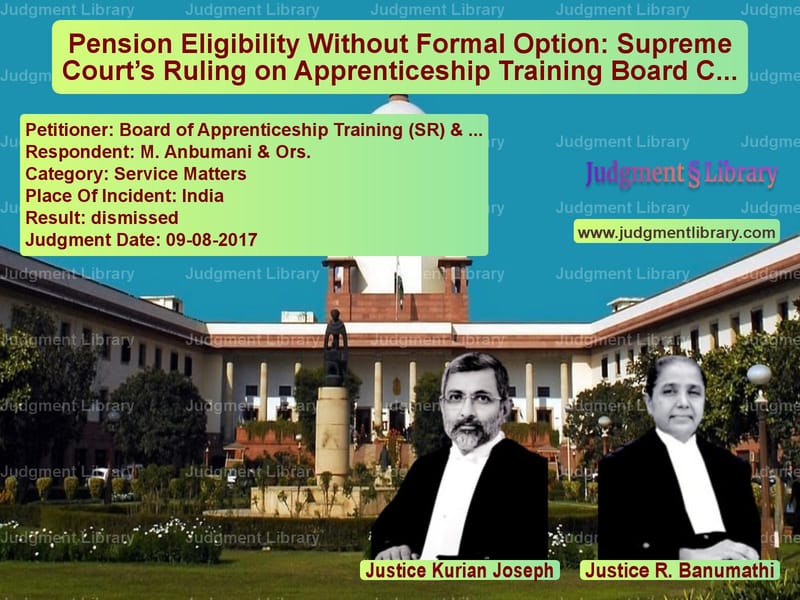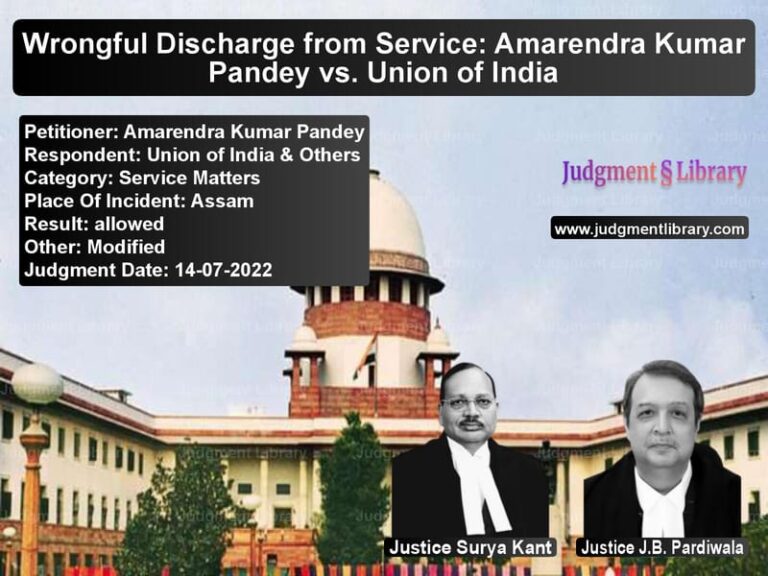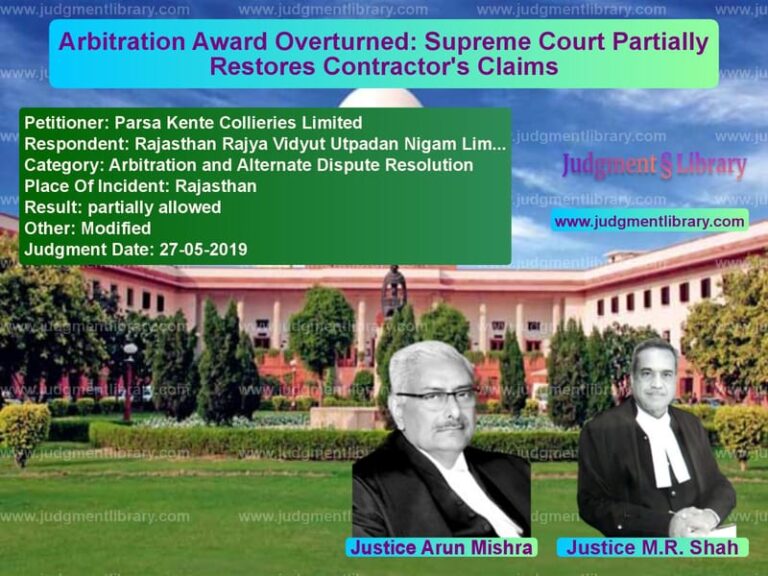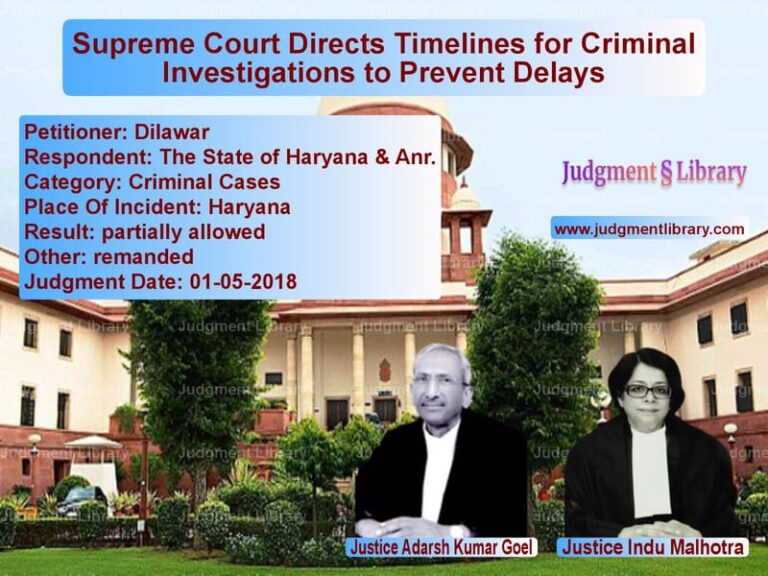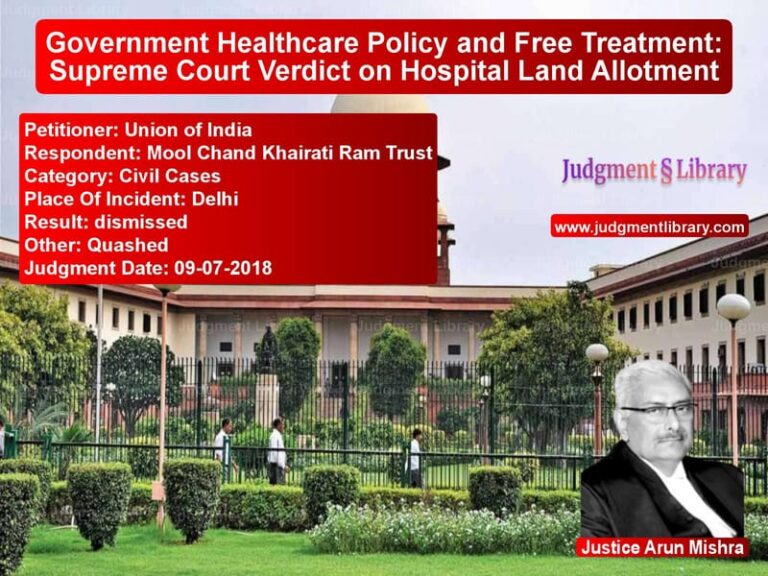Pension Eligibility Without Formal Option: Supreme Court’s Ruling on Apprenticeship Training Board Case
The Supreme Court of India in the case of Board of Apprenticeship Training (SR) & Anr. vs. M. Anbumani & Ors. addressed a crucial issue concerning pension eligibility for employees who had not formally opted for the pension scheme. The case revolved around whether an individual who did not submit an option within the prescribed time limit could still be granted pension benefits. The judgment provides clarity on the importance of opting into pension schemes and highlights the Court’s use of discretionary powers under Article 142 of the Indian Constitution.
In this judgment, the Supreme Court upheld the High Court’s decision, allowing the respondent to retain pension benefits despite not formally opting in. However, the Court made it clear that this judgment should not be treated as a precedent for other cases.
Background of the Case
The case involved M. Anbumani, an employee of the Board of Apprenticeship Training (SR), who had not exercised his option for pension within the stipulated time. The employer, Board of Apprenticeship Training (SR), contended that pension benefits were available only to those who opted for them within the prescribed period.
The respondent approached the High Court, which ruled in his favor, granting pension benefits despite the lack of formal opt-in. Aggrieved by the decision, the Board of Apprenticeship Training filed an appeal before the Supreme Court.
Arguments by the Petitioner
The Board of Apprenticeship Training (SR) and the Union of India, represented by the Additional Solicitor General, argued:
- Pension benefits were only available to employees who had exercised their option within the prescribed period.
- The respondent had failed to opt for pension within the required timeframe and, therefore, could not claim the benefits.
- Granting pension benefits to employees who had not opted in would violate established service rules and create a financial burden.
- The High Court’s decision could set a precedent, leading to similar claims from other employees.
Arguments by the Respondents
The respondent, M. Anbumani, countered the petitioner’s claims with the following arguments:
- The circumstances of his employment and retirement warranted an exception.
- His financial situation justified granting pension benefits, despite not having opted in formally.
- The High Court had rightly exercised its discretion in recognizing his right to pension.
Supreme Court’s Observations
The Supreme Court bench, comprising Justice Kurian Joseph and Justice R. Banumathi, examined the matter and observed:
“Pension is not available to a person who has not opted for the same within the time permitted for the option.”
However, recognizing the unique facts of the case, the Court exercised its discretionary power under Article 142 of the Indian Constitution:
“Having regard to the peculiar facts, as disclosed by the High Court in the judgment, we are of the view that this is a fit case where we should exercise our jurisdiction under Article 142 of the Constitution of India and retain the benefits granted to Respondent No.1 by the High Court.”
The Supreme Court made it clear that this decision was specific to the facts of the case and should not be considered a precedent:
“The impugned judgment shall not be treated as a precedent as the same is rendered only on the peculiar facts of the case and it shall not be treated as law for any other purpose.”
Legal Principles Affirmed
The ruling reinforced several key legal principles:
- Requirement of Opting for Pension: Employees must formally opt for pension benefits within the prescribed timeframe.
- Discretionary Power Under Article 142: The Supreme Court can exercise extraordinary jurisdiction to ensure justice in exceptional cases.
- Case-Specific Rulings: Judgments based on unique facts should not be considered binding precedents.
- Financial Considerations in Pension Claims: Courts may consider financial hardships in exceptional circumstances but cannot override formal requirements arbitrarily.
Conclusion
The Supreme Court disposed of the appeal, upholding the High Court’s decision but explicitly stating that it should not serve as a precedent for future cases. The judgment highlights the necessity for employees to comply with procedural requirements while also demonstrating the Court’s ability to provide relief in exceptional circumstances.
This ruling serves as a reminder that while legal formalities must generally be followed, courts can use discretionary powers to address unique hardships on a case-by-case basis.
Don’t miss out on the full details! Download the complete judgment in PDF format below and gain valuable insights instantly!
Download Judgment: Board of Apprentices vs M. Anbumani & Ors. Supreme Court of India Judgment Dated 09-08-2017.pdf
Direct Downlaod Judgment: Direct downlaod this Judgment
See all petitions in Pension and Gratuity
See all petitions in Employment Disputes
See all petitions in Public Sector Employees
See all petitions in Judgment by Kurian Joseph
See all petitions in Judgment by R. Banumathi
See all petitions in dismissed
See all petitions in supreme court of India judgments August 2017
See all petitions in 2017 judgments
See all posts in Service Matters Category
See all allowed petitions in Service Matters Category
See all Dismissed petitions in Service Matters Category
See all partially allowed petitions in Service Matters Category

